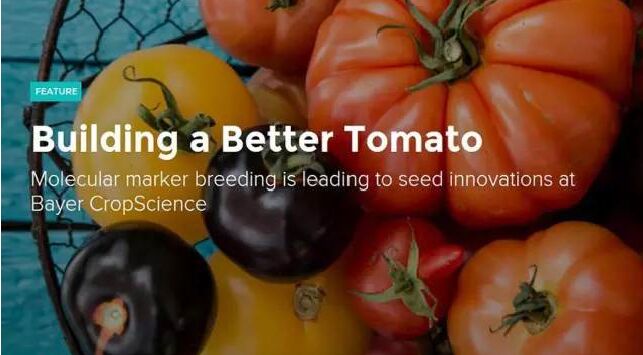
From the past to the present, top breeding engineers from all over the world have been working hard to provide better products for future development. The ancestors and the previous generation of gardeners carefully selected the crop seeds that best suited the local conditions and kept them in order to obtain a good harvest in the coming year or in the future. Taking tomato as an example, after decades of selective breeding, the seeds of various local varieties showed distinct specific regional characteristics. Over time, these varieties have adapted to the local environment, promoted genetic crop diversity, and demonstrated excellent disease resistance.
Coult Engels, a breeder of Bayer CropScience in the Netherlands, and Dr. Pieter van Poppel, recently shared their gratifying progress in tomato breeding research with Fluidigm. Their team is developing new varieties of tomato that can meet different cultivation methods and climates around the world. Because each region has its own unique requirements and methods, their breeding work must focus on a series of specific trait analysis.
Bigger, better, faster...
Innovations in laboratory science can guide breeders in actual large-scale production, cultivating high-yielding seeds and new hybrid varieties to achieve rapid resistance to diseases, pests and adverse environmental conditions such as drought and high Salt. The optimization of agronomic traits increasingly provides better product shelf life, uniformity, stability, washability, density and durability, which greatly increases the profitability of the growers and the food supply, such as the more delicious tomato pizza and salad.
Modern breeding focuses on how to fight fungi, bacteria, viruses, and pests such as mites, whiteflies, and the like that are known to cause tomato production. “Tomato plants need high yields, disease resistance and adaptation to local growth conditions,†explains Engels Master. “Fruits must have good shape, color, hardness, storability, size and taste. Our tomato varieties must not only satisfy growers. Demand, but also to meet the requirements of traders, retailers and consumers."
Application of molecular breeding <br>Molecular marker breeding methods have obvious advantages in seed production, promotion of plant gene recognition and attention to traits, such as selection of resistance. Cell and tissue culture is more suitable for the development of DH strain-specific germplasm resources in vitro and further expansion of the crop genetic database.
“Understanding the characteristics of plants at the molecular level has accelerated the production of new seed varieties,†Engels said. “The average release time from R&D to market is about 10 years. By analyzing leaf samples, an ideal gene can be quickly identified. Without waiting for the plant to mature, molecular biologists can save a lot of time and significantly reduce research and development costs."
Advantages of SNP detection in tomato breeding
According to Dr. van Poppel, Bayer Crop Science Marker-Assisted Breeding Scientist, in this study, they used the FIR1TM system of Fluidigm, combined with JunoTM 96.96 Genotyping IFC and 192.24 DynamicArrayTM IFC, to perform end-point genotyping studies.
“We used whole-genome markers and molecular marker-assisted backcrossing techniques instead of single-trait linkage markers to perform genetic mapping of new traits to distinguish different crop populations,†explains Dr. van Poppel, “Generating genes on the Fluidigm IFC research system. The classification analysis can optimize the optimal SNP number and sample number matching."
Engels agrees: “Every group needs specific marker selection, which can be achieved by using Fluidigm IFCS. Once the mapped quantitative trait loci are identified, further screening can be assisted by a single trait linkage marker. Phenotypic analysis is often expensive and time consuming, and it also depends on the season. Molecular markers allow breeders to easily track agronomic traits of interest, such as color and appearance, while genome-wide markers allow breeding experts to Apply molecular marker-assisted backcrossing techniques to the selection of offspring."
The new seed varieties developed by Bayer mainly aim to improve the above traits, including: yield, appearance, shelf life, resistance to pests and diseases, drought resistance and mites. In addition, taste-related features are also critical (about 100 genes are known to be specific to taste). Engels found that in order to develop new hybrids with specific traits in the pure inbred father and maternal, it may take up to seven generations of independent self-pollinated genetic purity hybrids. Molecular labeling methods can quickly help select the desired trait.
Engels said: "In a breeding step, hundreds of genes cannot be changed. Molecular marker-assisted breeding focuses on genes that can regulate multiple crop phenotypes simultaneously." He explained that by combining the analysis of individual gene phenotypic information, Bayer is developing SNP markers that are closely related to traits in order to gradually improve the genetic lineage of the crop.
Increasing the value of seeds <br>Because hybrids generally have higher yields and stronger resistance than traditional cultivars, Bayer uses hybrid vigor control methods for cross selection of parental pure inbred lines. When the breeder performs optimal breeding, the plants show significant heterosis. He pointed out: "Using a wide range of germplasm resources and regional differences, the genetic differences between parental inbred lines can be made larger and thus obtain stronger heterosis."
Improvements in recent years have been derived from the optimal parental selection for the development of high quality hybrids. In fact, heterosis is only part of the story. Crossbreeding with germplasm resources around the world, selecting germplasm with ideal traits, developing new seeds, and improving global crop varieties are issues that breeding experts have been thinking about.
When Bayer develops a new seed, it will apply for Plant Variety Protection (PVP). Regulators may give such a request to prohibit third parties from replicating specific varieties, but growers can continue to use improved plant germplasm resources regardless of origin.
Engels provides a brief overview of how Bayer cultivates seed varieties that are resistant to specific growth conditions such as drought, low temperature or high salt: “We have developed specific techniques and methods for vegetable seeds to improve seed quality, yield, and improve production techniques and The process of embedding and granulation makes the seeds more uniform when germinated, while the seed stimulating effect makes seeding simpler and more targeted."
He added: "Once we find that a particular gene is associated with tolerance or resistance to specific adverse conditions, we look for molecular markers to make further research and future development easier and faster."
For more information about FLUIDIGM products, please contact Fuluda (Shanghai) Instrument Technology Co., Ltd.
Cn.fluidigm.com
Phone mailbox: 
Cooking Wine,Rice Cooking Wine,Onion Ginger Cooking Wine,Sour Cooking Wine
Chinese Seasoning (Shandong) Trading Co.,Ltd , https://www.zt-trading.com